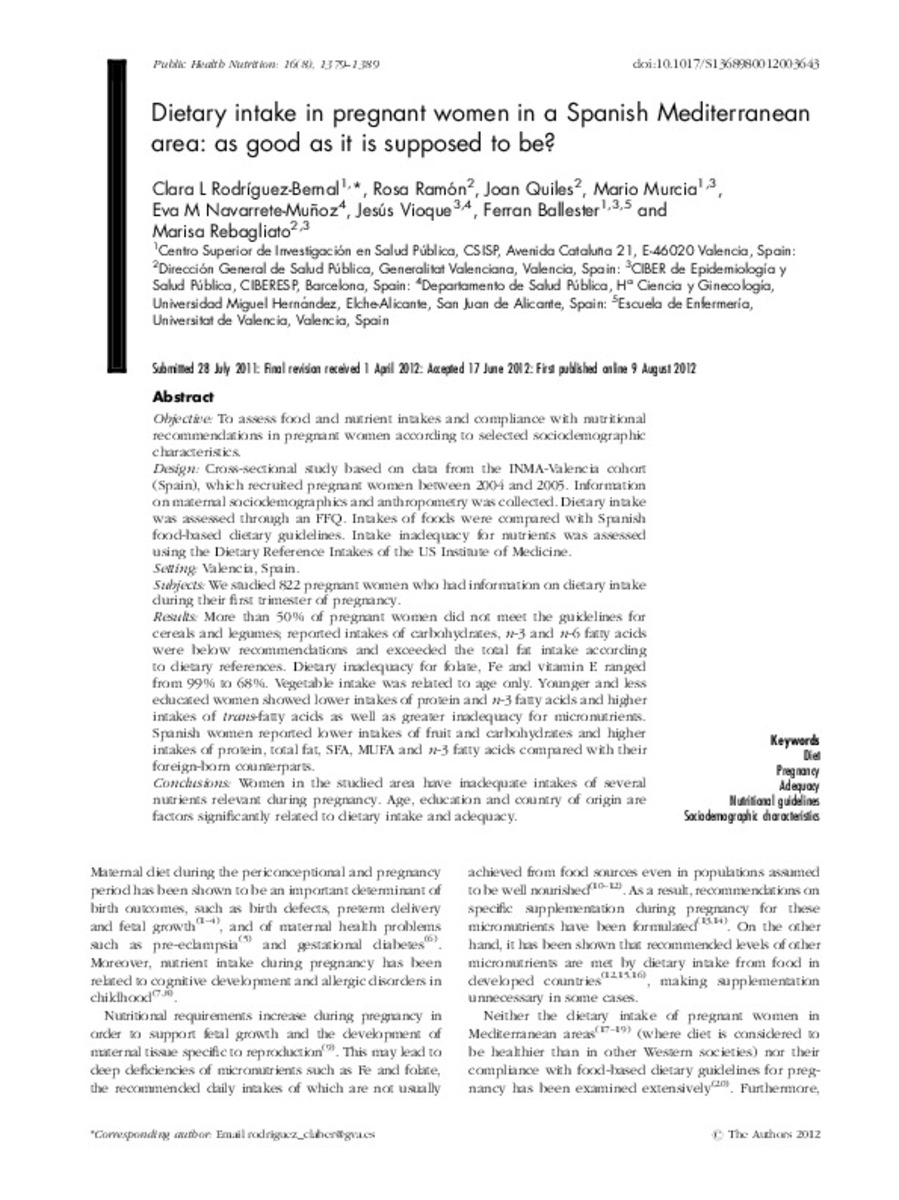Mostrar el registro sencillo del ítem
Dietary intake in pregnant women in a Spanish Mediterranean area: as good as it is supposed to be?
| dc.contributor.author | Rebagliato, Marisa | |
| dc.contributor.author | Ramón, Rosa | |
| dc.contributor.author | Murcia, Mario | |
| dc.contributor.author | Navarrete-Muñoz, Eva María | |
| dc.contributor.author | Vioque, Jesus | |
| dc.contributor.author | Ballester, Ferran | |
| dc.contributor.author | Rodríguez-Bernal, Clara L. | |
| dc.contributor.author | Quiles, Joan | |
| dc.date.accessioned | 2014-06-24T10:19:10Z | |
| dc.date.available | 2014-06-24T10:19:10Z | |
| dc.date.issued | 2013-08 | |
| dc.identifier.citation | RODRÍGUEZ-BERNAL, Clara L., et al. Dietary intake in pregnant women in a Spanish Mediterranean area: as good as it is supposed to be?. Public health nutrition, 2013, vol. 16, no 08, p. 1379-1389 | ca_CA |
| dc.identifier.issn | 1368-9800 | |
| dc.identifier.uri | http://hdl.handle.net/10234/95733 | |
| dc.description.abstract | Objective To assess food and nutrient intakes and compliance with nutritional recommendations in pregnant women according to selected sociodemographic characteristics. Design Cross-sectional study based on data from the INMA-Valencia cohort (Spain), which recruited pregnant women between 2004 and 2005. Information on maternal sociodemographics and anthropometry was collected. Dietary intake was assessed through an FFQ. Intakes of foods were compared with Spanish food-based dietary guidelines. Intake inadequacy for nutrients was assessed using the Dietary Reference Intakes of the US Institute of Medicine. Setting Valencia, Spain. Subjects We studied 822 pregnant women who had information on dietary intake during their first trimester of pregnancy. Results More than 50 % of pregnant women did not meet the guidelines for cereals and legumes; reported intakes of carbohydrates, n-3 and n-6 fatty acids were below recommendations and exceeded the total fat intake according to dietary references. Dietary inadequacy for folate, Fe and vitamin E ranged from 99 % to 68 %. Vegetable intake was related to age only. Younger and less educated women showed lower intakes of protein and n-3 fatty acids and higher intakes of trans-fatty acids as well as greater inadequacy for micronutrients. Spanish women reported lower intakes of fruit and carbohydrates and higher intakes of protein, total fat, SFA, MUFA and n-3 fatty acids compared with their foreign-born counterparts. Conclusions Women in the studied area have inadequate intakes of several nutrients relevant during pregnancy. Age, education and country of origin are factors significantly related to dietary intake and adequacy. | ca_CA |
| dc.format.extent | 11 p. | ca_CA |
| dc.format.mimetype | application/pdf | ca_CA |
| dc.language.iso | eng | ca_CA |
| dc.publisher | Cambridge University Press | ca_CA |
| dc.relation.isPartOf | Public Health Nutrition (2013) vol. 16, no. 8 | ca_CA |
| dc.rights | © Cambridge University Press | ca_CA |
| dc.rights.uri | http://rightsstatements.org/vocab/InC/1.0/ | * |
| dc.subject | Diet | ca_CA |
| dc.subject | Pregnancy | ca_CA |
| dc.subject | Adequacy | ca_CA |
| dc.subject | Nutritional guidelines | ca_CA |
| dc.subject | Sociodemographic characteristics | ca_CA |
| dc.title | Dietary intake in pregnant women in a Spanish Mediterranean area: as good as it is supposed to be? | ca_CA |
| dc.type | info:eu-repo/semantics/article | ca_CA |
| dc.identifier.doi | http://dx.doi.org/10.1017/S1368980012003643 | |
| dc.rights.accessRights | info:eu-repo/semantics/openAccess | ca_CA |
| dc.relation.publisherVersion | http://journals.cambridge.org/action/displayAbstract?fromPage=online&aid=8951198&fileId=S1368980012003643 | ca_CA |
| dc.type.version | info:eu-repo/semantics/publishedVersion |
Ficheros en el ítem
Este ítem aparece en la(s) siguiente(s) colección(ones)
-
MED_Articles [637]
Articles de publicacions periòdiques







